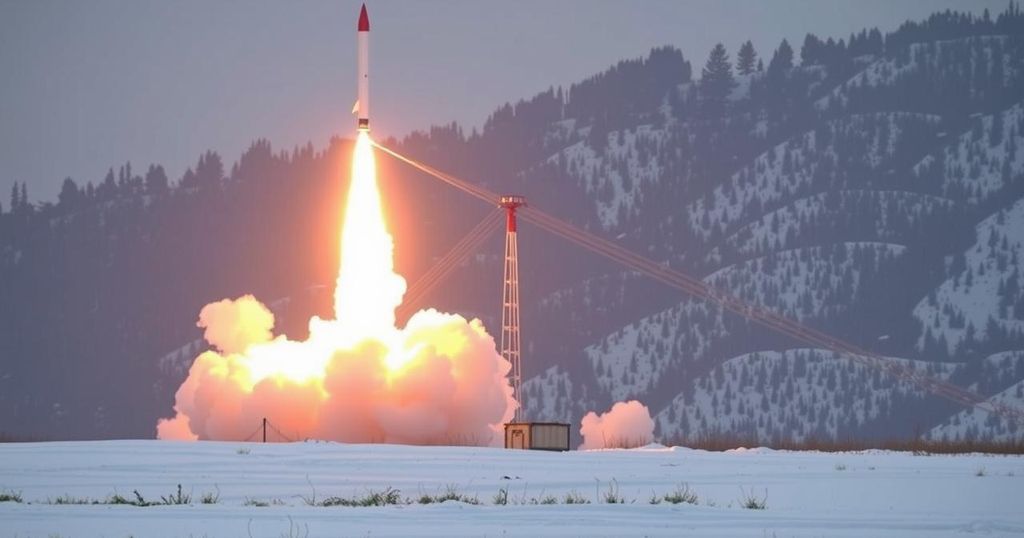North Korea Launches Missile Amid U.S. Warnings Over Russia Partnership

North Korea launched a missile during Secretary of State Antony Blinken’s visit to South Korea, amid growing concerns of Pyongyang’s cooperation with Russia in military technology. Blinken condemned North Korea’s actions, highlighting the need for trilateral collaboration and warning against Russia’s support for North Korean militarization, against the backdrop of political turmoil in South Korea with President Yoon’s impeachment.
North Korea launched a missile on the same day that United States Secretary of State Antony Blinken visited South Korea, where he expressed concerns regarding Pyongyang’s growing cooperation with Russia in advanced space technology. Blinken’s visit coincided with political turmoil in South Korea, as President Yoon Suk Yeol faced impeachment proceedings, which led him to remain in residence. During his discussions in Seoul, a North Korean ballistic missile was fired, landing in the sea after traveling approximately 1,100 kilometers (680 miles). Blinken stated, “Today’s launch is just a reminder to all of us of how important our collaborative work is,” underscoring the need for strengthened trilateral engagements to counter these provocations.
At a news conference with South Korean Foreign Minister Cho Tae-yul, Blinken condemned the missile launch and highlighted Russia’s increasing military support for North Korea, particularly in response to the conflict in Ukraine. He warned that North Korea is already receiving military equipment and training from Russia, and speculated that Moscow might share advanced satellite technology with Pyongyang. Blinken’s comments suggested a growing concern that Russia could formally recognize North Korea as a nuclear state, which would undermine the international consensus on denuclearization efforts.
Blinken also addressed South Korean concerns regarding North Korea’s technological advancements. In Tokyo, Japanese Prime Minister Shigeru Ishiba expressed alarm over these developments, noting improvements in North Korean capabilities. Blinken reaffirmed the commitment of the United States to engage diplomatically with North Korea amidst ongoing tensions.
Throughout his visit, Blinken maintained a neutral stance on the internal strife in South Korea while commending the nation’s democratic resilience. He emphasized the United States’ unwavering support for South Korea and reiterated confidence in its institutions. Transportation and discussions included references to Yoon’s prior favorable relations with the Biden administration, highlighting the necessity of continuity in foreign policy even amid political upheaval. South Korea’s commitment to strengthening its alliances with both the United States and Japan remains a focal point for ongoing diplomatic efforts.
The geopolitical landscape in East Asia is heavily influenced by the actions of North Korea, particularly its missile tests and nuclear ambitions. Relationships between North Korea, the United States, and South Korea are complicated by regional and global security concerns, including cooperation and possible military alliances with other nations such as Russia. Recently, North Korea’s collaboration with Russia raises alarms regarding the balance of power in the region, especially as North Korea purportedly receives military assistance in exchange for support in the ongoing conflict in Ukraine. Political instability in South Korea, illustrated by President Yoon Suk Yeol’s impeachment, adds a layer of complexity to diplomatic engagements, making it critical for U.S. officials like Secretary Blinken to navigate these tensions carefully while ensuring continued trilateral collaboration with Japan and South Korea.
In conclusion, North Korea’s recent missile launch serves as a stark reminder of the persistent threats posed by its military advancements, exacerbated by its increasing alliance with Russia. Secretary Blinken’s visit to South Korea during this tumultuous period emphasizes the importance of collaborative defense and intelligence-sharing among allies. The political instability in South Korea, highlighted by President Yoon’s impeachment, underscores the challenges facing U.S. diplomacy in the region, making it vital for the Biden administration to maintain a steadfast foreign policy aimed at curbing North Korea’s nuclear ambitions and fostering regional stability.
Original Source: www.dawn.com






